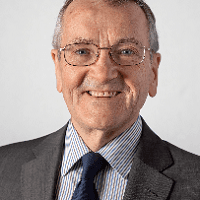
Frederick Charles Campbell
Surgery
Belfast, North Ireland, United Kingdom
Connect with the speaker?
Frederick Charles Campbell a clinically qualified researcher and work seeks a mechanistic basis for cancer morphology, one of the best-established predictors of clinical outcome. This previously impenetrable area of research has been revolutionized by the new methodology. Fundamental genetic regulation of spatiotemporal processes of tissue homeostasis has been uncovered in organotypic epithelial culture models. With others, Frederick's defined the homeostatic role of the apical PTEN/CDC42/PRKCZ pathway in mitotic spindle dynamics, epithelial alignment, and the development of aluminized colorectal glandular architecture. Frederick's group showed how oncogenic destabilization of these processes can generate distinct colorectal cancer (CRC) morphology phenotypes.
Firstly, we revealed how oncogenic misorientation of the mitotic spindle generates aberrant epithelial stratification and multi-lumen formation. In combination, these abnormal processes lead to cribriform morphology, a histological marker of neoplastic transformation in colonic adenomas. Furthermore, we showed how an oncogenic co-dependency between Src and the centrosomal kinase polo-like kinase 4 (PLK4) can generate multipolar mitotic spindle (MMS) formation, a major mitotic aberration. In turn, we also showed that MMS formation drives traits of high-grade cancer including chromosomal instability (CIN), cell and nuclear pleomorphism, and invasion. Cancer morphology is intrinsically linked to invasion, progression, and clinical outcome. New mechanistic insights will enable novel therapy targeted against aggressive cancer morphologies. These advances may transform the lives of 50% of the global population, who are expected to develop some form of cancer during their lifetime.
Firstly, we revealed how oncogenic misorientation of the mitotic spindle generates aberrant epithelial stratification and multi-lumen formation. In combination, these abnormal processes lead to cribriform morphology, a histological marker of neoplastic transformation in colonic adenomas. Furthermore, we showed how an oncogenic co-dependency between Src and the centrosomal kinase polo-like kinase 4 (PLK4) can generate multipolar mitotic spindle (MMS) formation, a major mitotic aberration. In turn, we also showed that MMS formation drives traits of high-grade cancer including chromosomal instability (CIN), cell and nuclear pleomorphism, and invasion. Cancer morphology is intrinsically linked to invasion, progression, and clinical outcome. New mechanistic insights will enable novel therapy targeted against aggressive cancer morphologies. These advances may transform the lives of 50% of the global population, who are expected to develop some form of cancer during their lifetime.

